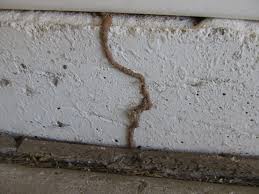 Termites and Phoenix Homes
Termites and Phoenix Homes
At some point in the inspection process, a diligent buyer will need to have a termite inspection, also known as a Wood-Destroying Organism or Insect Inspection. This typically is done at the same time as the general home inspection. Many inspectors are also licensed to perform termite inspections which adds about $55 to the general home inspection cost. While the most common termite in Arizona is not as destructive as those found in other parts of the country, a thorough inspection is a wise choice in order to protect an asset as valuable as a home.
Types of termites most commonly found in Phoenix
Subterranean Termites Subterranean termites are the most commonly found in Arizona. They live under ground and require large amounts of moisture. Therefore evidence of subterranean termites come in the form of “shelter tubes” from the ground extending upward to the wood source seeking cellulose. An inspection of the stem wall by inspectors is standard procedure looking for subterranean termites tubes. Within the subterranean termites category, the most common is the arid-land subterranean termite versus the desert subterranean.
Drywood Termites Unlike subterranean termites, drywood termites live within the wood. Evidence of drywood termites is “sand like” fecal material and kick out holes on the ceiling, wall, or wood. Treated wood during construction is one method of prevention. Drywood termites are considered non-subterranean termites, since they do not live in the ground, require no ground contact, and do not build mud shelter tubes. Drywood termites are more prevalent in costal areas.
Checking the treatment history for a house – If you would like to know about the history of termite inspections for a specific property go to Termite Treatment History Search and enter the address. This will give you a history of the inspections and treatment. This is a page within the Arizona Office of Pest Management website. If you’d like to receive automatically listings of homes, click on Receive listings of homes automatically. Please describe in detail your dream home.
Termite Trivia
While we look at termites with disdain because they invade and infest our homes without invitation, here are some interesting trivia facts about termites that you’ve probably never known:
* Termites are actually beneficial insects, ecologically speaking. Termites are actually important decomposers. Termites break down tough plant fibers, recycling dead and decaying trees into new soil. These hungry insects are vital to the health of our forests. As they tunnel, termites also aerate and improve the soil. It just so happens that we build our homes from termite food – wood.
*Termite fathers help raise their young. You won’t find deadbeat dads in the termite mound. Unlike bee colonies, where males are short-lived and die soon after mating, the termite kings stick around. After their nuptial flight, the termite king stays with his queen, fertilizing her eggs as needed. He also shares parental duties with the queen, helping her feed their young predigested food.
* Termite workers and soldiers are almost always blind. In almost all species, both the workers and soldiers in a given termite colony are blind. Since these industrious individuals spend their lives in the confines of the dark, damp nest, they have no need to develop functional eyes. Reproductive termites are the only termites that require eyesight, since they must fly to find mates and new nest sites.
* Chemical cues guide most communication in the termite colony. Termites use pheromones, special chemical scents, to talk to one another and control each other’s behavior. Termites leave scent trails to guide other workers using special glands on their chests. Each colony produces a distinct scent, identified by a chemical on their cuticles. In some species, the queen can even control the growth and role of her young by feeding her pheromone-laden poop.
Trivia information supplied by www.insects.about.com
Serious home buyers should always have a Wood-Destroying Organism or Insect Inspection performed. This is a fancy way to say termite inspection. This should be performed along side a general home inspection which is part of the due diligence process carried out during the inspection period.
If you’re looking for that special home but need help finding it, go to send me listings and describe what you’re looking for and I’ll be glad to help.
Related Posts
Driving through Phoenix streets – virtually

